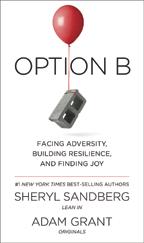
“Option B: Facing Adversity, Building Resilience, and
Finding Joy”
by Sheryl Sandberg and Adam Grant (Knopf, 2017)
Many of us like to take some extra time during the summer with a good book (or Kindle) in our hands, and hopefully summertime can be a chance to grow Jewishly as well.
Though not found in the “Judaica” section of your local bookstore, Sheryl Sandberg and Adam Grant’s best-seller, “Option B: Facing Adversity, Building Resilience, and Finding Joy,” is one of the best Jewish books you may read this summer.
Adam Grant is a TED Talk-famous professor at the Wharton School of Business at the University of Pennsylvania and is the co-author of the book, though it is written in Sandberg’s voice. In addition to personal anecdotes of resilience in the most horrifying of situations, as well as Silicon Valley derring-do, the book draws heavily on the work of University of Pennsylvania psychologist Martin Seligman (whose work I relied heavily on in my High Holiday sermons on happiness I delivered a few years ago).
Sheryl Sandberg is the COO of Facebook; an alumna of Google, the Clinton administration and Harvard University; and arguably one of the most successful women in American business today. She was married to Dave Goldberg, who was the CEO of SurveyMonkey.com and who died suddenly while on a treadmill during a family vacation a little over a year ago.
Instantly, this incredibly successful executive, blessed with an amazing partner of a spouse, was a widow in her 40s raising two children on her own and managing Facebook. The book is bracingly honest. It is more truthful than the celebrity gossip magazines that glamorize the perfection or revel in the disaster of the Hollywood elite. Instead, Sandberg opens up about a woman facing a pain that all of the power, all of the money and all of the prestige in the world cannot heal. The title comes from the conclusion of her introduction first written in a lengthy personal Facebook post she wrote on her husband’s shloshim (30-day mourning memorial). Sandberg speaks about breaking down when there is a father-child activity for one child. A friend says to her: “Option A is not available. So let’s just kick the s--- out of Option B.”
Sandberg shares many practical ways to find resilience in one’s own life, and also how to parent toward resilience. Unlike many self-help books, Sandberg doesn’t always soar. She stumbles, and moves forward. She falters, and celebrates small triumphs. In short, she is human.
I find Sandberg’s humanness refreshing, since my biggest critique of Facebook as a presence in our lives is that it encourages a type of “oversharing” that makes one think that everyone has a perfect life. “Option B” teaches all of us that even those with a “perfect life” are not insulated from tragedy. Also, this book gives us tools not just to be resilient in the face of grief and loss, but how to be present for others who are grieving.
Finally, “Option B” is one of the most unabashedly and naturally Jewish personal reflections on mourning. Sandberg writes lovingly of the Jewish mourning rituals she practiced and reflects on the meaningful relationship she has with her faith without being dogmatic or proselytizing. She recalls conversations with rabbis, the bittersweet moments of a friend’s daughter’s Bat Mitzvah and singing “Oseh Shalom” with her children.
If there is one thing that binds us together, it is that we all experience grief and loss. Though the book is inspired from Sandberg’s sudden widowhood, the tools she gives and the stories she tells are relevant for many types of loss. This is not only a book to read, but one to give from a friend to another.